Analyzing Government Regulation and Housing Market Intervention
VerifiedAdded on 2023/06/03
|8
|1900
|293
Report
AI Summary
This report examines the impact of government intervention on the housing market, with a specific focus on the regulation of rental prices. The introduction highlights the importance of housing and the challenges posed by rapid urbanization, poverty, and environmental degradation, emphasizing the need for government intervention to ensure adequate shelter. The report explores various types of intervention, concentrating on government regulation of rental prices, discussing the benefits and drawbacks of such policies. The analysis includes discussions on rent control, its impact on affordability, and its effects on both tenants and landlords. The report also looks at examples from Germany and the US, analyzing how different regulatory approaches affect homeownership and rental markets. It further examines the effects of rental price capping, illustrating how it can create housing shortages and disincentivize investment. The report concludes that rental price capping must be implemented alongside other policies to be effective and avoid unintended consequences. The report is supported by relevant references, providing a comprehensive overview of the subject.
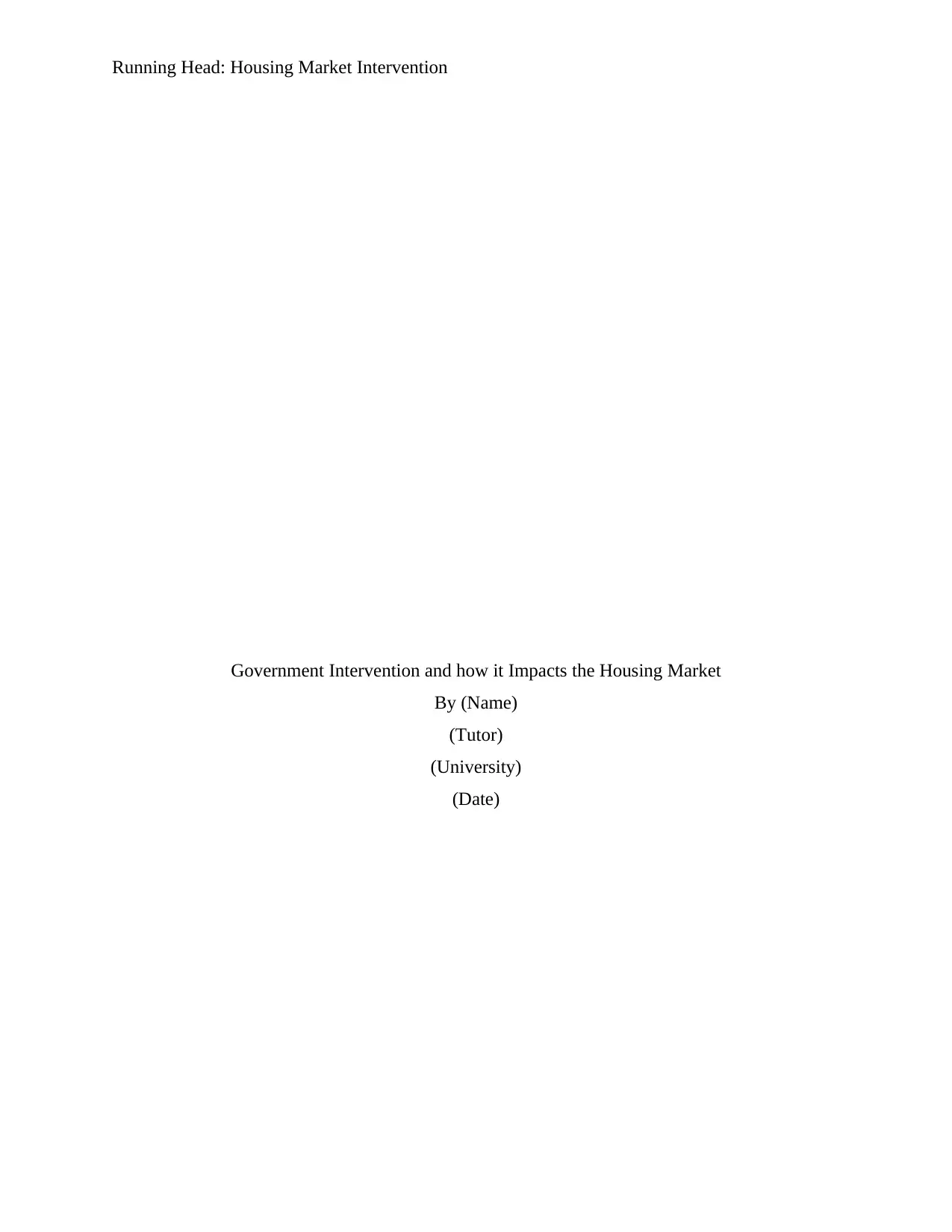
Running Head: Housing Market Intervention
Government Intervention and how it Impacts the Housing Market
By (Name)
(Tutor)
(University)
(Date)
Government Intervention and how it Impacts the Housing Market
By (Name)
(Tutor)
(University)
(Date)
Paraphrase This Document
Need a fresh take? Get an instant paraphrase of this document with our AI Paraphraser
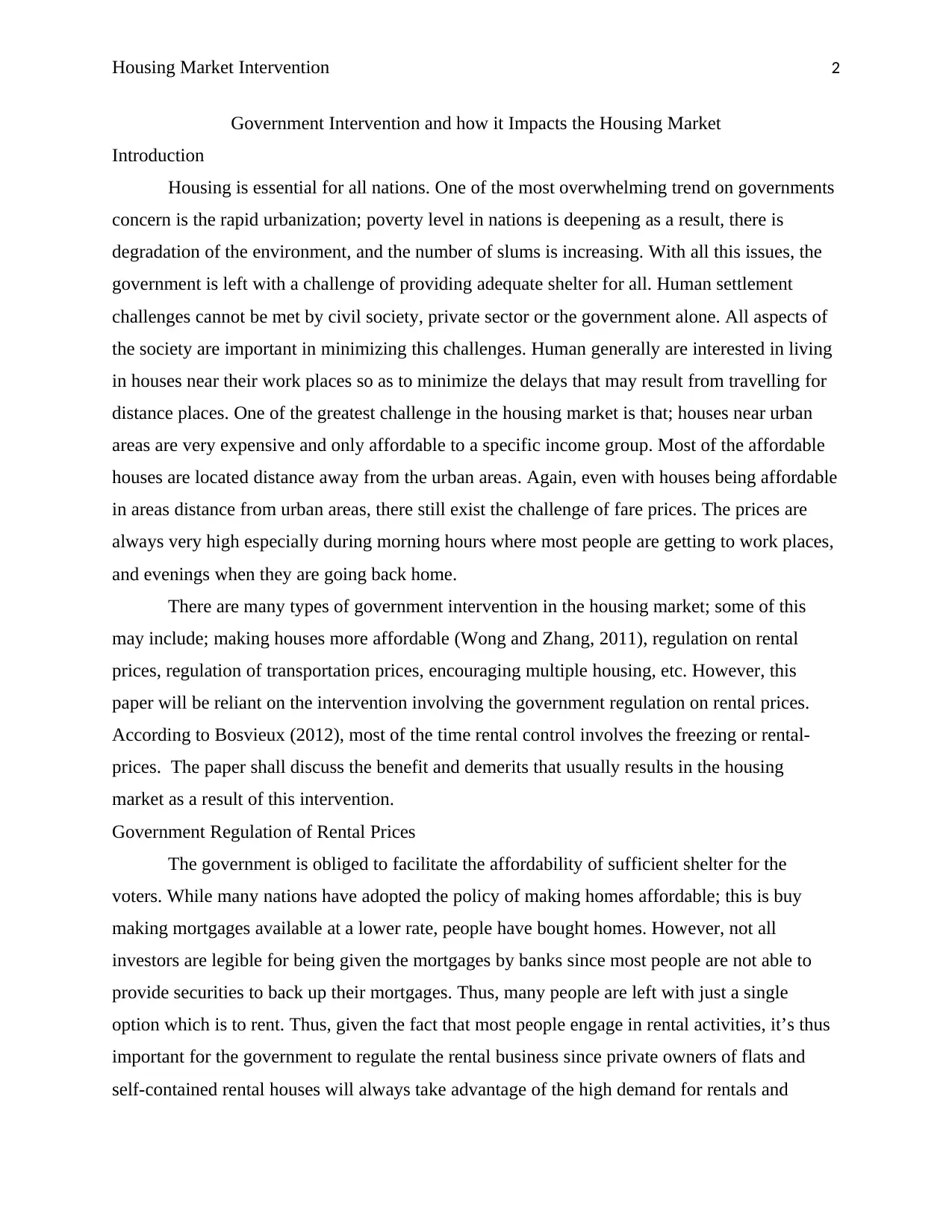
Housing Market Intervention 2
Government Intervention and how it Impacts the Housing Market
Introduction
Housing is essential for all nations. One of the most overwhelming trend on governments
concern is the rapid urbanization; poverty level in nations is deepening as a result, there is
degradation of the environment, and the number of slums is increasing. With all this issues, the
government is left with a challenge of providing adequate shelter for all. Human settlement
challenges cannot be met by civil society, private sector or the government alone. All aspects of
the society are important in minimizing this challenges. Human generally are interested in living
in houses near their work places so as to minimize the delays that may result from travelling for
distance places. One of the greatest challenge in the housing market is that; houses near urban
areas are very expensive and only affordable to a specific income group. Most of the affordable
houses are located distance away from the urban areas. Again, even with houses being affordable
in areas distance from urban areas, there still exist the challenge of fare prices. The prices are
always very high especially during morning hours where most people are getting to work places,
and evenings when they are going back home.
There are many types of government intervention in the housing market; some of this
may include; making houses more affordable (Wong and Zhang, 2011), regulation on rental
prices, regulation of transportation prices, encouraging multiple housing, etc. However, this
paper will be reliant on the intervention involving the government regulation on rental prices.
According to Bosvieux (2012), most of the time rental control involves the freezing or rental-
prices. The paper shall discuss the benefit and demerits that usually results in the housing
market as a result of this intervention.
Government Regulation of Rental Prices
The government is obliged to facilitate the affordability of sufficient shelter for the
voters. While many nations have adopted the policy of making homes affordable; this is buy
making mortgages available at a lower rate, people have bought homes. However, not all
investors are legible for being given the mortgages by banks since most people are not able to
provide securities to back up their mortgages. Thus, many people are left with just a single
option which is to rent. Thus, given the fact that most people engage in rental activities, it’s thus
important for the government to regulate the rental business since private owners of flats and
self-contained rental houses will always take advantage of the high demand for rentals and
Government Intervention and how it Impacts the Housing Market
Introduction
Housing is essential for all nations. One of the most overwhelming trend on governments
concern is the rapid urbanization; poverty level in nations is deepening as a result, there is
degradation of the environment, and the number of slums is increasing. With all this issues, the
government is left with a challenge of providing adequate shelter for all. Human settlement
challenges cannot be met by civil society, private sector or the government alone. All aspects of
the society are important in minimizing this challenges. Human generally are interested in living
in houses near their work places so as to minimize the delays that may result from travelling for
distance places. One of the greatest challenge in the housing market is that; houses near urban
areas are very expensive and only affordable to a specific income group. Most of the affordable
houses are located distance away from the urban areas. Again, even with houses being affordable
in areas distance from urban areas, there still exist the challenge of fare prices. The prices are
always very high especially during morning hours where most people are getting to work places,
and evenings when they are going back home.
There are many types of government intervention in the housing market; some of this
may include; making houses more affordable (Wong and Zhang, 2011), regulation on rental
prices, regulation of transportation prices, encouraging multiple housing, etc. However, this
paper will be reliant on the intervention involving the government regulation on rental prices.
According to Bosvieux (2012), most of the time rental control involves the freezing or rental-
prices. The paper shall discuss the benefit and demerits that usually results in the housing
market as a result of this intervention.
Government Regulation of Rental Prices
The government is obliged to facilitate the affordability of sufficient shelter for the
voters. While many nations have adopted the policy of making homes affordable; this is buy
making mortgages available at a lower rate, people have bought homes. However, not all
investors are legible for being given the mortgages by banks since most people are not able to
provide securities to back up their mortgages. Thus, many people are left with just a single
option which is to rent. Thus, given the fact that most people engage in rental activities, it’s thus
important for the government to regulate the rental business since private owners of flats and
self-contained rental houses will always take advantage of the high demand for rentals and
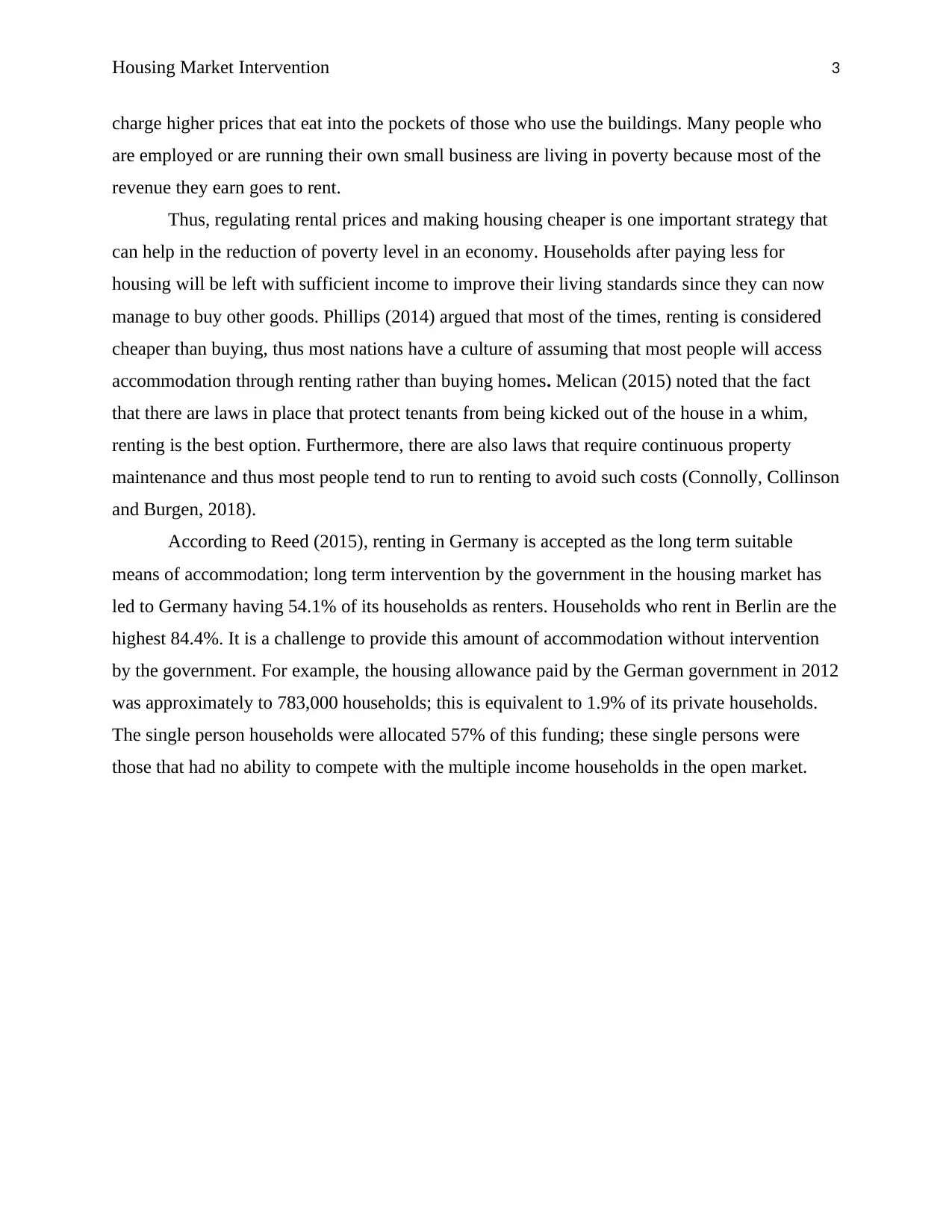
Housing Market Intervention 3
charge higher prices that eat into the pockets of those who use the buildings. Many people who
are employed or are running their own small business are living in poverty because most of the
revenue they earn goes to rent.
Thus, regulating rental prices and making housing cheaper is one important strategy that
can help in the reduction of poverty level in an economy. Households after paying less for
housing will be left with sufficient income to improve their living standards since they can now
manage to buy other goods. Phillips (2014) argued that most of the times, renting is considered
cheaper than buying, thus most nations have a culture of assuming that most people will access
accommodation through renting rather than buying homes. Melican (2015) noted that the fact
that there are laws in place that protect tenants from being kicked out of the house in a whim,
renting is the best option. Furthermore, there are also laws that require continuous property
maintenance and thus most people tend to run to renting to avoid such costs (Connolly, Collinson
and Burgen, 2018).
According to Reed (2015), renting in Germany is accepted as the long term suitable
means of accommodation; long term intervention by the government in the housing market has
led to Germany having 54.1% of its households as renters. Households who rent in Berlin are the
highest 84.4%. It is a challenge to provide this amount of accommodation without intervention
by the government. For example, the housing allowance paid by the German government in 2012
was approximately to 783,000 households; this is equivalent to 1.9% of its private households.
The single person households were allocated 57% of this funding; these single persons were
those that had no ability to compete with the multiple income households in the open market.
charge higher prices that eat into the pockets of those who use the buildings. Many people who
are employed or are running their own small business are living in poverty because most of the
revenue they earn goes to rent.
Thus, regulating rental prices and making housing cheaper is one important strategy that
can help in the reduction of poverty level in an economy. Households after paying less for
housing will be left with sufficient income to improve their living standards since they can now
manage to buy other goods. Phillips (2014) argued that most of the times, renting is considered
cheaper than buying, thus most nations have a culture of assuming that most people will access
accommodation through renting rather than buying homes. Melican (2015) noted that the fact
that there are laws in place that protect tenants from being kicked out of the house in a whim,
renting is the best option. Furthermore, there are also laws that require continuous property
maintenance and thus most people tend to run to renting to avoid such costs (Connolly, Collinson
and Burgen, 2018).
According to Reed (2015), renting in Germany is accepted as the long term suitable
means of accommodation; long term intervention by the government in the housing market has
led to Germany having 54.1% of its households as renters. Households who rent in Berlin are the
highest 84.4%. It is a challenge to provide this amount of accommodation without intervention
by the government. For example, the housing allowance paid by the German government in 2012
was approximately to 783,000 households; this is equivalent to 1.9% of its private households.
The single person households were allocated 57% of this funding; these single persons were
those that had no ability to compete with the multiple income households in the open market.
⊘ This is a preview!⊘
Do you want full access?
Subscribe today to unlock all pages.

Trusted by 1+ million students worldwide
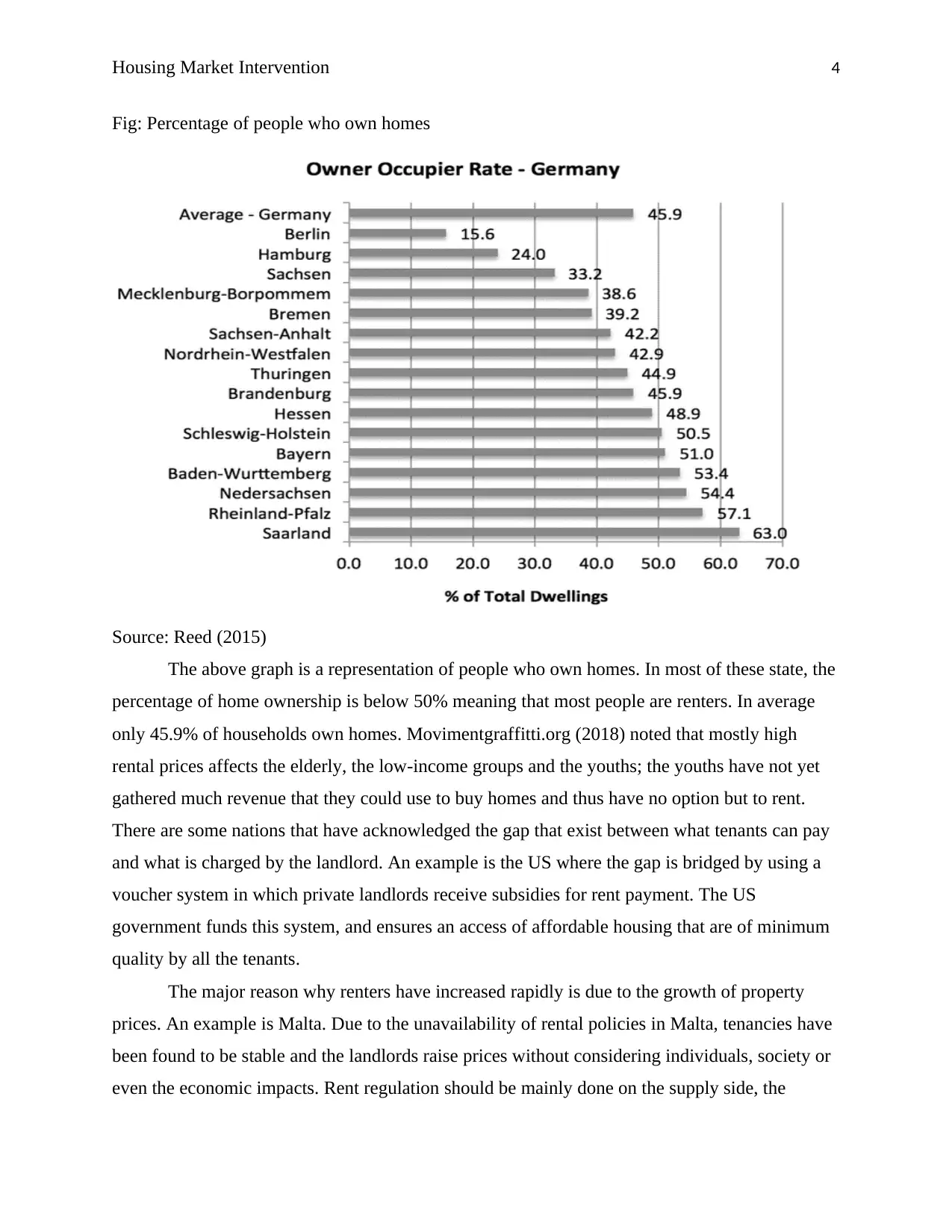
Housing Market Intervention 4
Fig: Percentage of people who own homes
Source: Reed (2015)
The above graph is a representation of people who own homes. In most of these state, the
percentage of home ownership is below 50% meaning that most people are renters. In average
only 45.9% of households own homes. Movimentgraffitti.org (2018) noted that mostly high
rental prices affects the elderly, the low-income groups and the youths; the youths have not yet
gathered much revenue that they could use to buy homes and thus have no option but to rent.
There are some nations that have acknowledged the gap that exist between what tenants can pay
and what is charged by the landlord. An example is the US where the gap is bridged by using a
voucher system in which private landlords receive subsidies for rent payment. The US
government funds this system, and ensures an access of affordable housing that are of minimum
quality by all the tenants.
The major reason why renters have increased rapidly is due to the growth of property
prices. An example is Malta. Due to the unavailability of rental policies in Malta, tenancies have
been found to be stable and the landlords raise prices without considering individuals, society or
even the economic impacts. Rent regulation should be mainly done on the supply side, the
Fig: Percentage of people who own homes
Source: Reed (2015)
The above graph is a representation of people who own homes. In most of these state, the
percentage of home ownership is below 50% meaning that most people are renters. In average
only 45.9% of households own homes. Movimentgraffitti.org (2018) noted that mostly high
rental prices affects the elderly, the low-income groups and the youths; the youths have not yet
gathered much revenue that they could use to buy homes and thus have no option but to rent.
There are some nations that have acknowledged the gap that exist between what tenants can pay
and what is charged by the landlord. An example is the US where the gap is bridged by using a
voucher system in which private landlords receive subsidies for rent payment. The US
government funds this system, and ensures an access of affordable housing that are of minimum
quality by all the tenants.
The major reason why renters have increased rapidly is due to the growth of property
prices. An example is Malta. Due to the unavailability of rental policies in Malta, tenancies have
been found to be stable and the landlords raise prices without considering individuals, society or
even the economic impacts. Rent regulation should be mainly done on the supply side, the
Paraphrase This Document
Need a fresh take? Get an instant paraphrase of this document with our AI Paraphraser
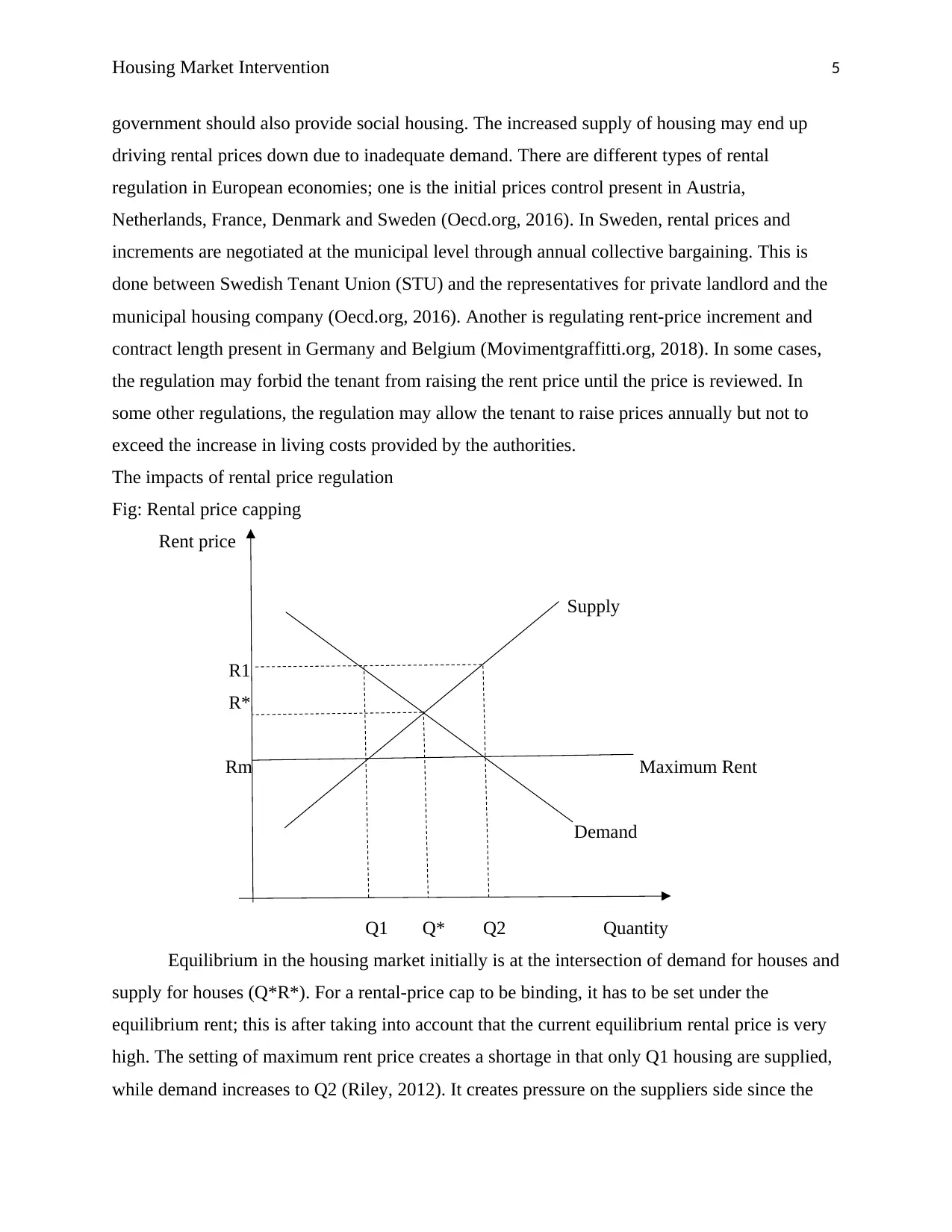
Housing Market Intervention 5
government should also provide social housing. The increased supply of housing may end up
driving rental prices down due to inadequate demand. There are different types of rental
regulation in European economies; one is the initial prices control present in Austria,
Netherlands, France, Denmark and Sweden (Oecd.org, 2016). In Sweden, rental prices and
increments are negotiated at the municipal level through annual collective bargaining. This is
done between Swedish Tenant Union (STU) and the representatives for private landlord and the
municipal housing company (Oecd.org, 2016). Another is regulating rent-price increment and
contract length present in Germany and Belgium (Movimentgraffitti.org, 2018). In some cases,
the regulation may forbid the tenant from raising the rent price until the price is reviewed. In
some other regulations, the regulation may allow the tenant to raise prices annually but not to
exceed the increase in living costs provided by the authorities.
The impacts of rental price regulation
Fig: Rental price capping
Rent price
Supply
R1
R*
Rm Maximum Rent
Demand
Q1 Q* Q2 Quantity
Equilibrium in the housing market initially is at the intersection of demand for houses and
supply for houses (Q*R*). For a rental-price cap to be binding, it has to be set under the
equilibrium rent; this is after taking into account that the current equilibrium rental price is very
high. The setting of maximum rent price creates a shortage in that only Q1 housing are supplied,
while demand increases to Q2 (Riley, 2012). It creates pressure on the suppliers side since the
government should also provide social housing. The increased supply of housing may end up
driving rental prices down due to inadequate demand. There are different types of rental
regulation in European economies; one is the initial prices control present in Austria,
Netherlands, France, Denmark and Sweden (Oecd.org, 2016). In Sweden, rental prices and
increments are negotiated at the municipal level through annual collective bargaining. This is
done between Swedish Tenant Union (STU) and the representatives for private landlord and the
municipal housing company (Oecd.org, 2016). Another is regulating rent-price increment and
contract length present in Germany and Belgium (Movimentgraffitti.org, 2018). In some cases,
the regulation may forbid the tenant from raising the rent price until the price is reviewed. In
some other regulations, the regulation may allow the tenant to raise prices annually but not to
exceed the increase in living costs provided by the authorities.
The impacts of rental price regulation
Fig: Rental price capping
Rent price
Supply
R1
R*
Rm Maximum Rent
Demand
Q1 Q* Q2 Quantity
Equilibrium in the housing market initially is at the intersection of demand for houses and
supply for houses (Q*R*). For a rental-price cap to be binding, it has to be set under the
equilibrium rent; this is after taking into account that the current equilibrium rental price is very
high. The setting of maximum rent price creates a shortage in that only Q1 housing are supplied,
while demand increases to Q2 (Riley, 2012). It creates pressure on the suppliers side since the
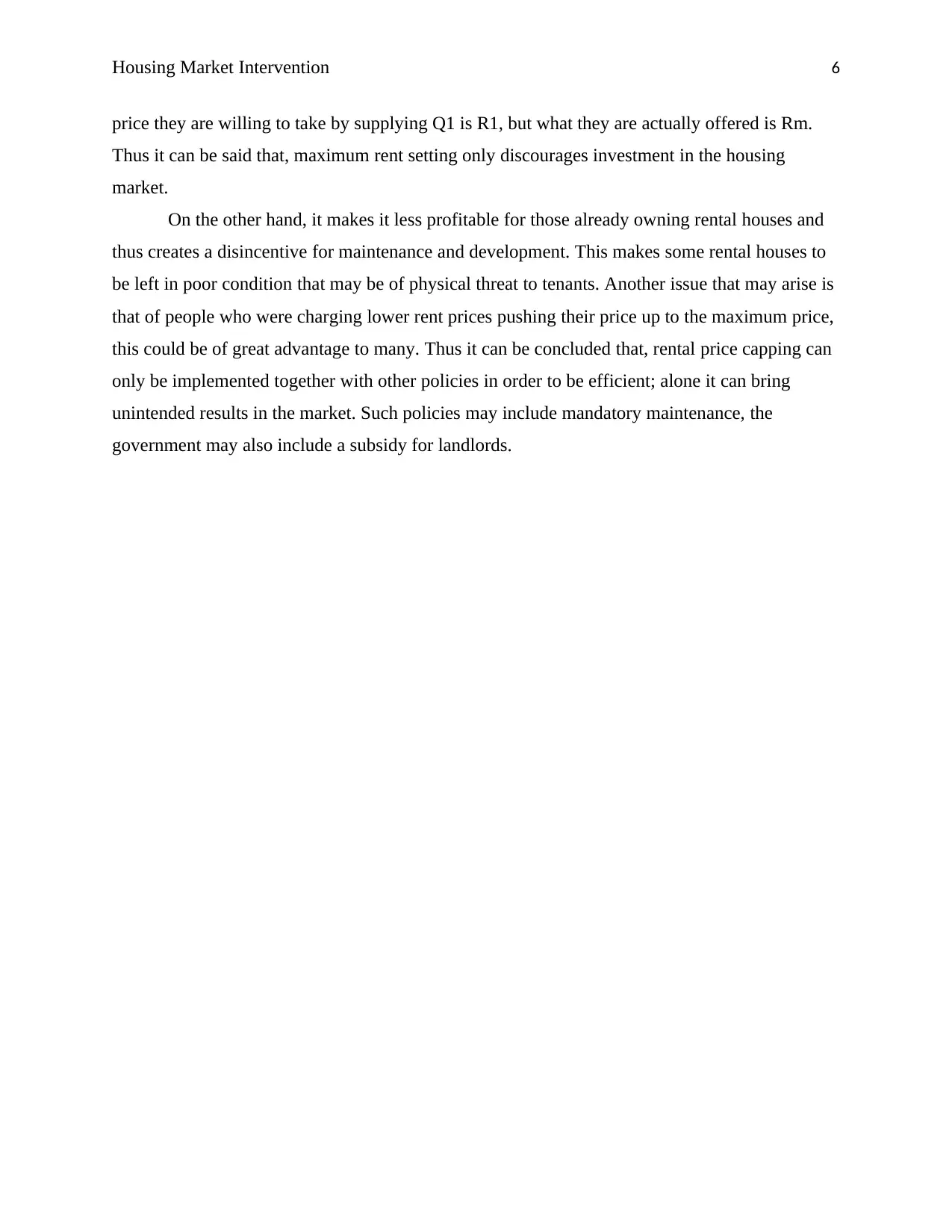
Housing Market Intervention 6
price they are willing to take by supplying Q1 is R1, but what they are actually offered is Rm.
Thus it can be said that, maximum rent setting only discourages investment in the housing
market.
On the other hand, it makes it less profitable for those already owning rental houses and
thus creates a disincentive for maintenance and development. This makes some rental houses to
be left in poor condition that may be of physical threat to tenants. Another issue that may arise is
that of people who were charging lower rent prices pushing their price up to the maximum price,
this could be of great advantage to many. Thus it can be concluded that, rental price capping can
only be implemented together with other policies in order to be efficient; alone it can bring
unintended results in the market. Such policies may include mandatory maintenance, the
government may also include a subsidy for landlords.
price they are willing to take by supplying Q1 is R1, but what they are actually offered is Rm.
Thus it can be said that, maximum rent setting only discourages investment in the housing
market.
On the other hand, it makes it less profitable for those already owning rental houses and
thus creates a disincentive for maintenance and development. This makes some rental houses to
be left in poor condition that may be of physical threat to tenants. Another issue that may arise is
that of people who were charging lower rent prices pushing their price up to the maximum price,
this could be of great advantage to many. Thus it can be concluded that, rental price capping can
only be implemented together with other policies in order to be efficient; alone it can bring
unintended results in the market. Such policies may include mandatory maintenance, the
government may also include a subsidy for landlords.
⊘ This is a preview!⊘
Do you want full access?
Subscribe today to unlock all pages.

Trusted by 1+ million students worldwide
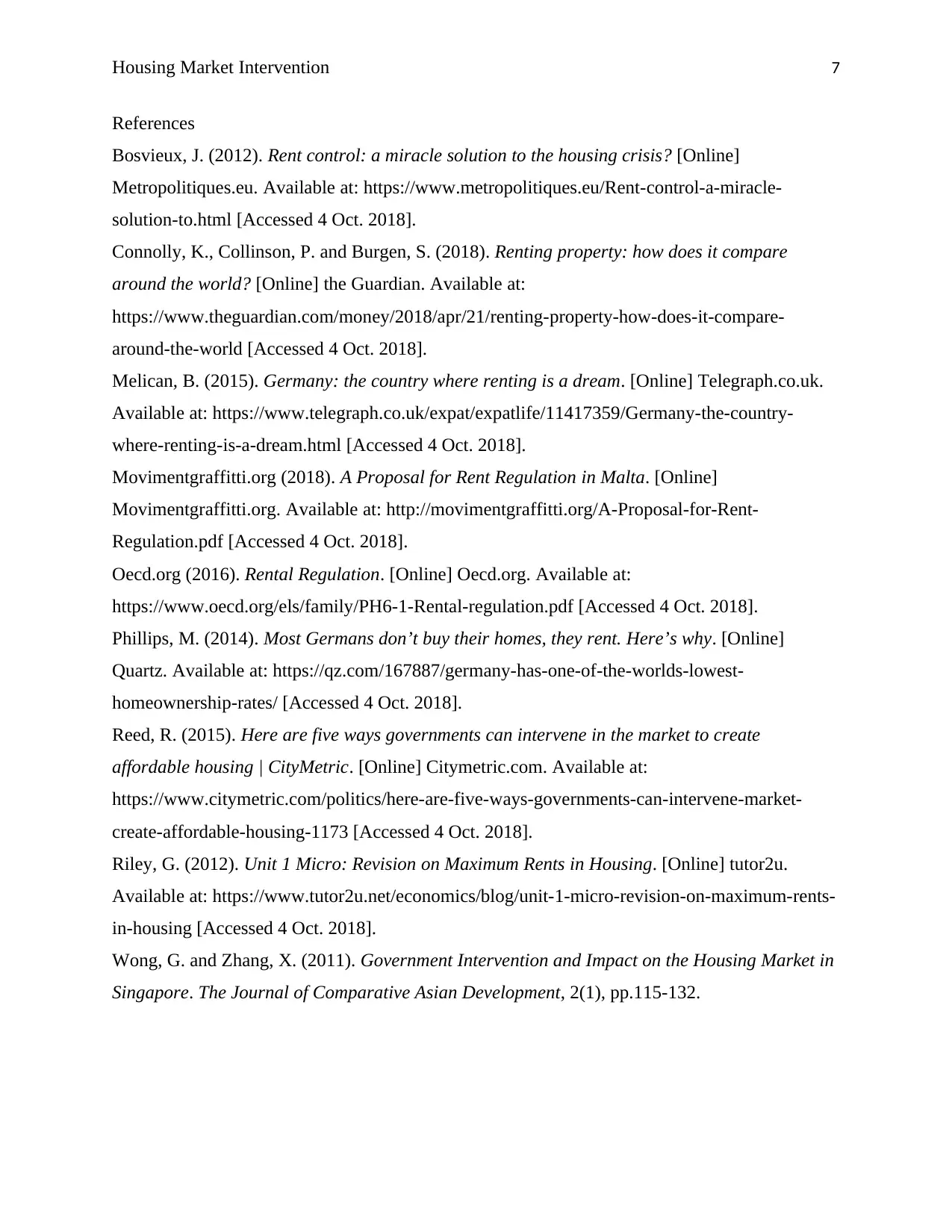
Housing Market Intervention 7
References
Bosvieux, J. (2012). Rent control: a miracle solution to the housing crisis? [Online]
Metropolitiques.eu. Available at: https://www.metropolitiques.eu/Rent-control-a-miracle-
solution-to.html [Accessed 4 Oct. 2018].
Connolly, K., Collinson, P. and Burgen, S. (2018). Renting property: how does it compare
around the world? [Online] the Guardian. Available at:
https://www.theguardian.com/money/2018/apr/21/renting-property-how-does-it-compare-
around-the-world [Accessed 4 Oct. 2018].
Melican, B. (2015). Germany: the country where renting is a dream. [Online] Telegraph.co.uk.
Available at: https://www.telegraph.co.uk/expat/expatlife/11417359/Germany-the-country-
where-renting-is-a-dream.html [Accessed 4 Oct. 2018].
Movimentgraffitti.org (2018). A Proposal for Rent Regulation in Malta. [Online]
Movimentgraffitti.org. Available at: http://movimentgraffitti.org/A-Proposal-for-Rent-
Regulation.pdf [Accessed 4 Oct. 2018].
Oecd.org (2016). Rental Regulation. [Online] Oecd.org. Available at:
https://www.oecd.org/els/family/PH6-1-Rental-regulation.pdf [Accessed 4 Oct. 2018].
Phillips, M. (2014). Most Germans don’t buy their homes, they rent. Here’s why. [Online]
Quartz. Available at: https://qz.com/167887/germany-has-one-of-the-worlds-lowest-
homeownership-rates/ [Accessed 4 Oct. 2018].
Reed, R. (2015). Here are five ways governments can intervene in the market to create
affordable housing | CityMetric. [Online] Citymetric.com. Available at:
https://www.citymetric.com/politics/here-are-five-ways-governments-can-intervene-market-
create-affordable-housing-1173 [Accessed 4 Oct. 2018].
Riley, G. (2012). Unit 1 Micro: Revision on Maximum Rents in Housing. [Online] tutor2u.
Available at: https://www.tutor2u.net/economics/blog/unit-1-micro-revision-on-maximum-rents-
in-housing [Accessed 4 Oct. 2018].
Wong, G. and Zhang, X. (2011). Government Intervention and Impact on the Housing Market in
Singapore. The Journal of Comparative Asian Development, 2(1), pp.115-132.
References
Bosvieux, J. (2012). Rent control: a miracle solution to the housing crisis? [Online]
Metropolitiques.eu. Available at: https://www.metropolitiques.eu/Rent-control-a-miracle-
solution-to.html [Accessed 4 Oct. 2018].
Connolly, K., Collinson, P. and Burgen, S. (2018). Renting property: how does it compare
around the world? [Online] the Guardian. Available at:
https://www.theguardian.com/money/2018/apr/21/renting-property-how-does-it-compare-
around-the-world [Accessed 4 Oct. 2018].
Melican, B. (2015). Germany: the country where renting is a dream. [Online] Telegraph.co.uk.
Available at: https://www.telegraph.co.uk/expat/expatlife/11417359/Germany-the-country-
where-renting-is-a-dream.html [Accessed 4 Oct. 2018].
Movimentgraffitti.org (2018). A Proposal for Rent Regulation in Malta. [Online]
Movimentgraffitti.org. Available at: http://movimentgraffitti.org/A-Proposal-for-Rent-
Regulation.pdf [Accessed 4 Oct. 2018].
Oecd.org (2016). Rental Regulation. [Online] Oecd.org. Available at:
https://www.oecd.org/els/family/PH6-1-Rental-regulation.pdf [Accessed 4 Oct. 2018].
Phillips, M. (2014). Most Germans don’t buy their homes, they rent. Here’s why. [Online]
Quartz. Available at: https://qz.com/167887/germany-has-one-of-the-worlds-lowest-
homeownership-rates/ [Accessed 4 Oct. 2018].
Reed, R. (2015). Here are five ways governments can intervene in the market to create
affordable housing | CityMetric. [Online] Citymetric.com. Available at:
https://www.citymetric.com/politics/here-are-five-ways-governments-can-intervene-market-
create-affordable-housing-1173 [Accessed 4 Oct. 2018].
Riley, G. (2012). Unit 1 Micro: Revision on Maximum Rents in Housing. [Online] tutor2u.
Available at: https://www.tutor2u.net/economics/blog/unit-1-micro-revision-on-maximum-rents-
in-housing [Accessed 4 Oct. 2018].
Wong, G. and Zhang, X. (2011). Government Intervention and Impact on the Housing Market in
Singapore. The Journal of Comparative Asian Development, 2(1), pp.115-132.
Paraphrase This Document
Need a fresh take? Get an instant paraphrase of this document with our AI Paraphraser

Housing Market Intervention 8
1 out of 8
Related Documents
Your All-in-One AI-Powered Toolkit for Academic Success.
+13062052269
info@desklib.com
Available 24*7 on WhatsApp / Email
![[object Object]](/_next/static/media/star-bottom.7253800d.svg)
Unlock your academic potential
Copyright © 2020–2025 A2Z Services. All Rights Reserved. Developed and managed by ZUCOL.





